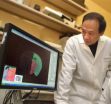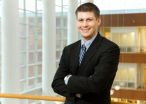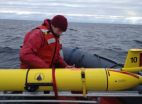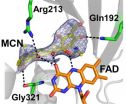(Press-News.org) PITTSBURGH—Self-moving gels can give synthetic materials the ability to "act alive" and mimic primitive biological communication, University of Pittsburgh researchers have found.
In a paper published in the Jan. 8 print edition of the Proceedings of the National Academy of Sciences, the Pitt research team demonstrates that a synthetic system can reconfigure itself through a combination of chemical communication and interaction with light.
Anna Balazs, principal investigator of the study and Distinguished Professor of Chemical and Petroleum Engineering in Pitt's Swanson School of Engineering, has long studied the properties of the Belousov-Zhabotinsky (BZ) gel, a material first fabricated in the late 1990s and shown to pulsate in the absence of any external stimuli.
In a previous study, the Pitt team noticed that long pieces of gel attached to a surface by one end "bent" toward one another, almost as if they were trying to communicate by sending signals. This hint that "chatter" might be taking place led the team to detach the fixed ends of the gels and allow them to move freely.
Balazs and her team developed a 3-D gel model to test the effects of the chemical signaling and light on the material. They found that when the gel pieces were moved far apart, they would automatically come back together, exhibiting autochemotaxis—the ability to both emit and sense a chemical, and move in response to that signal.
"This study demonstrates the ability of a synthetic material to actually 'talk to itself' and follow out a given action or command, similar to such biological species as amoeba and termites," said Balazs. "Imagine a LEGO® set that could by itself unsnap its parts and then put itself back together again in different shapes but also allow you to control those shapes through chemical reaction and light."
"We find this system to be extremely exciting and important because it provides a unique opportunity to study autochemotaxis in synthetic systems," said Olga Kuksenok, a member of the research team and research associate professor in the Swanson School's Department of Chemical Engineering.
###
The paper, "Reconfigurable assemblies of active, autochemotactic gels," has also appeared online in the Proceedings of the National Academy of Sciences. The work was partially supported by the National Science Foundation, Army Research Office, and Air Force Office of Scientific Research.
1/8/13/mab/cjhm END
Oscillating gel gives synthetic materials the ability to 'speak'
Pitt researchers uncover a synthetic material that rebuilds itself through chemical communication
2013-01-09
ELSE PRESS RELEASES FROM THIS DATE:
Smaller radiation fields can spare brain when treating tumors, Wake Forest Baptist research finds
2013-01-09
WINSTON-SALEM, N.C. – Jan. 9, 2013 – New research from Wake Forest Baptist Medical Center shows that patients suffering from aggressive brain tumors can be effectively treated with smaller radiation fields to spare the rest of the brain and preserve cognition.
"For patients with glioblastoma, we now know we can safely and effectively treat them with smaller radiation fields to spare the rest of their normal brain," said lead investigator Michael D. Chan, M.D., assistant professor of radiation oncology at Wake Forest Baptist. "That's important because it lessens the symptoms ...
Majority of Americans say new Congress should take immediate action to expand medical research
2013-01-09
Alexandria, Va.–January 9, 2013– America Speaks, Volume 13, a compilation of public opinion polls commissioned by Research!America, features timely data about Americans' views on issues related to biomedical and health research. A majority of Americans (72%) say the new Congress and the President should take action to expand medical research within the first 100 days of the 113th Congress. Public support for increased government spending on medical research holds particular relevance as Congress considers whether to further delay, eliminate or permit "sequestration," a ...
Hispanics leery of health care providers, often avoid cancer screenings, Moffitt study shows
2013-01-09
When researchers at Moffitt Cancer Center and colleagues conducted a random telephone survey among blacks, whites and Hispanics in New York, Baltimore and San Juan, Puerto Rico, they found that Hispanics are nearly twice as likely to report that fear of being used as a "guinea pig" and lack of trust in medical professionals contribute in being unwilling to participate in cancer screenings. The researchers concluded that health care providers need to do a better job of instilling trust and dispelling certain fears, particularly among Hispanics, to improve cancer screening ...
Eliminating useless information important to learning, making new memories
2013-01-09
AUGUSTA, Ga. – As we age, it just may be the ability to filter and eliminate old information – rather than take in the new stuff - that makes it harder to learn, scientists report.
"When you are young, your brain is able to strengthen certain connections and weaken certain connections to make new memories," said Dr. Joe Z. Tsien, neuroscientist at the Medical College of Georgia at Georgia Regents University and Co-Director of the GRU Brain & Behavior Discovery Institute.
It's that critical weakening that appears hampered in the older brain, according to a study in ...
Research: Bad news can spur strategic change in businesses
2013-01-09
CHAMPAIGN, Ill. — Negative media coverage may prompt firms to engage in greater levels of strategic change than previously thought, according to research by a University of Illinois business professor.
While businesses have typically viewed the news media as a megaphone for publicity, businesses have not viewed the media as an influential stakeholder capable of shaping the strategic decisions of key executives, says Michael K. Bednar, a professor of business administration at Illinois.
"As the news media reports negatively about firms, that registers with executives," ...
US health disadvantage spans age and socioeconomic groups
2013-01-09
WASHINGTON — On average, Americans die sooner and experience higher rates of disease and injury than people in other high-income countries, says a new report from the National Research Council and Institute of Medicine. The report finds that this health disadvantage exists at all ages from birth to age 75 and that even advantaged Americans -- those who have health insurance, college educations, higher incomes, and healthy behaviors -- appear to be sicker than their peers in other rich nations.
"We were struck by the gravity of these findings," said Steven H. Woolf, professor ...
Scientists use marine robots to detect endangered whales
2013-01-09
Two robots equipped with instruments designed to "listen" for the calls of baleen whales detected nine endangered North Atlantic right whales in the Gulf of Maine last month. The robots reported the detections to shore-based researchers within hours of hearing the whales (i.e., in real time), demonstrating a new and powerful tool for managing interactions between whales and human activities.
The team of researchers, led by Woods Hole Oceanographic Institution (WHOI) scientists Mark Baumgartner and Dave Fratantoni, reported their sightings to NOAA, the federal agency responsible ...
Drug resistance: 'Baby steps' can pay off big
2013-01-09
HOUSTON -- (Jan. 9, 2013) -- Rice University scientists have found that mutations of small effect can turn out to be game changers in the bacterial fight against antibiotic drugs.
The discovery came during an exhaustive, three-year effort to create a mathematical model that could accurately predict how specific mutations allow bacteria like E. coli to adapt to antibiotics like minocycline. The findings are detailed in a Dec. 10 study in the Proceedings of the National Academy of Sciences.
"As biologists, we tend to focus on big effects that result from big changes, ...
Hold the diet soda? Sweetened drinks linked to depression, coffee tied to lower risk
2013-01-09
SAN DIEGO – New research suggests that drinking sweetened beverages, especially diet drinks, is associated with an increased risk of depression in adults while drinking coffee was tied to a slightly lower risk. The study was released today and will be presented at the American Academy of Neurology's 65th Annual Meeting in San Diego, March 16 to 23, 2013.
"Sweetened beverages, coffee and tea are commonly consumed worldwide and have important physical—and may have important mental—health consequences," said study author Honglei Chen, MD, PhD, with the National Institutes ...
Study shows cognitive benefit of lifelong bilingualism
2013-01-09
Washington, DC — Seniors who have spoken two languages since childhood are faster than single-language speakers at switching from one task to another, according to a study published in the January 9 issue of The Journal of Neuroscience. Compared to their monolingual peers, lifelong bilinguals also show different patterns of brain activity when making the switch, the study found.
The findings suggest the value of regular stimulating mental activity across the lifetime. As people age, cognitive flexibility — the ability to adapt to unfamiliar or unexpected circumstances ...
LAST 30 PRESS RELEASES:
DGIST identifies “magic blueprint” for converting carbon dioxide into resources through atom-level catalyst design
COVID-19 vaccination during pregnancy may help prevent preeclampsia
Menopausal hormone therapy not linked to increased risk of death
Chronic shortage of family doctors in England, reveals BMJ analysis
Booster jabs reduce the risks of COVID-19 deaths, study finds
Screening increases survival rate for stage IV breast cancer by 60%
ACC announces inaugural fellow for the Thad and Gerry Waites Rural Cardiovascular Research Fellowship
University of Oklahoma researchers develop durable hybrid materials for faster radiation detection
Medicaid disenrollment spikes at age 19, study finds
Turning agricultural waste into advanced materials: Review highlights how torrefaction could power a sustainable carbon future
New study warns emerging pollutants in livestock and aquaculture waste may threaten ecosystems and public health
Integrated rice–aquatic farming systems may hold the key to smarter nitrogen use and lower agricultural emissions
Hope for global banana farming in genetic discovery
Mirror image pheromones help beetles swipe right
Prenatal lead exposure related to worse cognitive function in adults
Research alert: Understanding substance use across the full spectrum of sexual identity
Pekingese, Shih Tzu and Staffordshire Bull Terrier among twelve dog breeds at risk of serious breathing condition
Selected dog breeds with most breathing trouble identified in new study
Interplay of class and gender may influence social judgments differently between cultures
Pollen counts can be predicted by machine learning models using meteorological data with more than 80% accuracy even a week ahead, for both grass and birch tree pollen, which could be key in effective
Rewriting our understanding of early hominin dispersal to Eurasia
Rising simultaneous wildfire risk compromises international firefighting efforts
Honey bee "dance floors" can be accurately located with a new method, mapping where in the hive forager bees perform waggle dances to signal the location of pollen and nectar for their nestmates
Exercise and nutritional drinks can reduce the need for care in dementia
Michelson Medical Research Foundation awards $750,000 to rising immunology leaders
SfN announces Early Career Policy Ambassadors Class of 2026
Spiritual practices strongly associated with reduced risk for hazardous alcohol and drug use
Novel vaccine protects against C. diff disease and recurrence
An “electrical” circadian clock balances growth between shoots and roots
Largest study of rare skin cancer in Mexican patients shows its more complex than previously thought
[Press-News.org] Oscillating gel gives synthetic materials the ability to 'speak'Pitt researchers uncover a synthetic material that rebuilds itself through chemical communication



